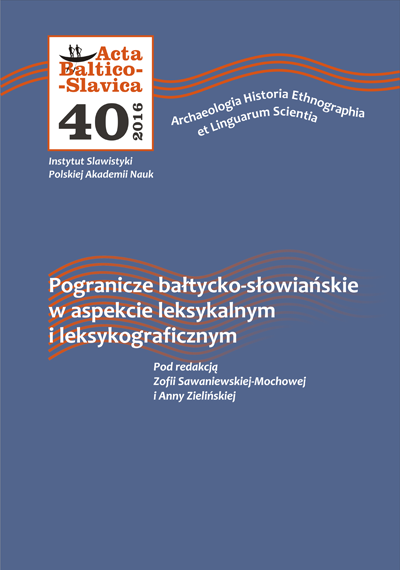Leksyka pochodzenia bałtyckiego w mieszanych białorusko-rosyjskich gwarach południowej Pskowszczyzny (rejon Siebieża i Newla)
The vocabulary of Baltic origin in mixed Belarusian-Russian dialects of the south Pskov region (the area of Sebezh and Nevel)
Author(s): Mirosław JankowiakSubject(s): Cultural history, Regional Geography, Language acquisition, Eastern Slavic Languages, Baltic Languages
Published by: Instytut Slawistyki Polskiej Akademii Nauk
Keywords: words of Baltic origin; mixed Belarusian-Russian dialects; borrowings; Pskov region;
Summary/Abstract: The article discusses the issue of the vocabulary of Baltic origin which functions in contemporary mixed Belarusian-Russian dialects. It contains analysis of the vocabulary of dialects functioning in the southern part of Pskov region – in the area of Sebezh and Nevel which once were part of the Polish-Lithuanian Commonwealth. The material basis was the author’s own recordings collected during a dialectological expedition carried out as a part of the TriMCo (Triangulation Approach for Modelling Convergence with a High Zoom-In Factor) project in 2014 as well as volumes of the Pskov regional dictionary (Псковский областной словарь). The southern part of Pskov region has been the place of contact of various languages and dialects (Russian, Belarusian, Lithuanian, Latvian, Polish, Yiddish). The Baltic vocabulary is connected mainly with the oldest layer of the lexis and concerns the traditional agriculture, farming, nature or features of people’s character and appearance. The material showed that the Belarusian dialect (now a mixture of Belarusian and Russian) helped to preserve words of Baltic origin. The number of words of Baltic origin is scant in those villages where there are Russian-speaking inhabitants and only few Belarusian language features. Interlocutors often highlight that they know a certain word only from their childhood and no-one describes things in that way.
Journal: Acta Baltico Slavica
- Issue Year: 2016
- Issue No: 40
- Page Range: 73-92
- Page Count: 20
- Language: Polish

